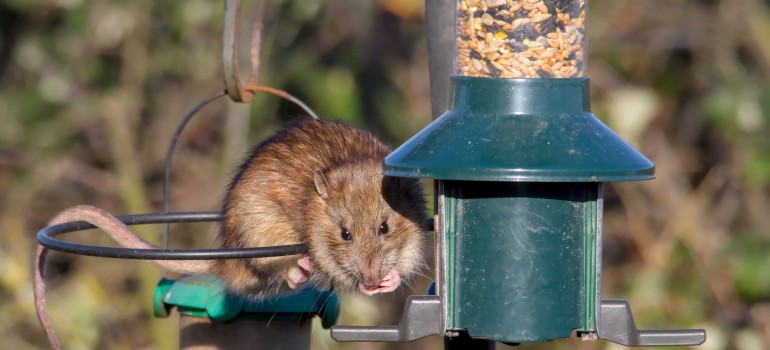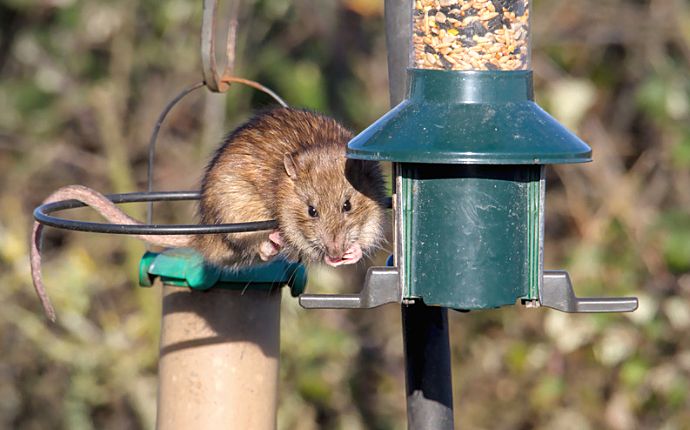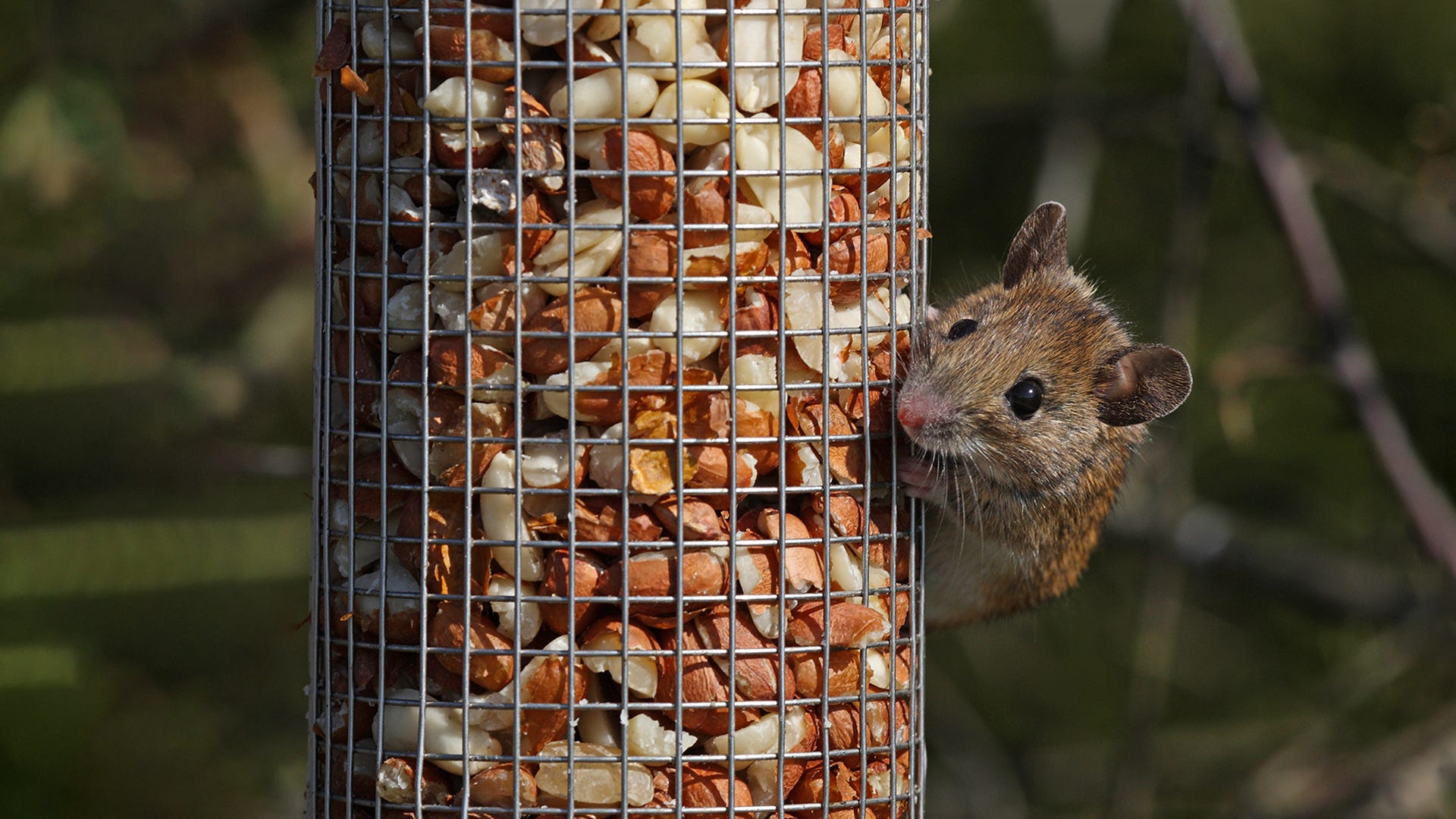Yes, bird seeds can attract rats. Rats are opportunistic feeders.
They seek out easy food sources. Many people enjoy feeding birds. However, spilled seeds can lure unwanted pests like rats. These rodents are drawn to the high-calorie content of bird seeds. This can lead to an increase in rat populations around your home.
It’s important to know how to feed birds without inviting rodents. Taking some simple precautions can help you enjoy birdwatching without dealing with rats. In this post, we will explore ways to prevent rats while still feeding your feathered friends. Stay with us as we dive into practical tips and solutions.
Bird Seeds And Rat Attraction
Bird seeds can attract rats due to their high nutritional content. Spilled seeds on the ground are especially inviting. Keeping feeding areas clean reduces the risk of attracting rodents.
## Bird Seeds and Rat Attraction Bird enthusiasts often worry if feeding birds might inadvertently attract rats. This concern is valid, as rats can be unwelcome guests in our gardens. Let’s dive into the common myths and scientific evidence surrounding this topic. ### Common Myths Many people believe that rats are primarily drawn to bird seeds. They think that if they feed birds, rats will inevitably come. But is this true? Not entirely. While bird seeds can attract rats, other factors play a significant role. For instance, rats are more likely to be attracted to easy food sources and shelter, such as open trash bins or compost heaps. Another myth is that all bird seeds attract rats equally. This is not the case. Certain types of seeds, like sunflower seeds, might be more appealing to rats. It’s crucial to understand these nuances to manage your garden effectively. ### Scientific Evidence Research shows that rats are opportunistic feeders. They will eat almost anything, not just bird seeds. In a study conducted by urban ecologists, rats were found to be attracted to various food sources, including pet food, fallen fruits, and even crumbs. Additionally, the presence of bird seeds alone doesn’t guarantee rat attraction. The environment plays a significant role. If you have dense vegetation or clutter, rats might find it easier to hide and access food. To minimize rat attraction, keep your garden tidy. Store bird seeds in sealed containers and clean up any spills immediately. Using bird feeders that are less accessible to rats can also help. ### Conclusion Feeding birds doesn’t necessarily mean inviting rats. It’s about managing your garden smartly. By debunking myths and understanding scientific facts, you can enjoy birdwatching without worrying about rats.Types Of Bird Seeds
Different types of bird seeds can attract rats. Spilled seeds on the ground are a common reason. Keeping feeders clean helps reduce the problem.
When you’re feeding birds, the type of seed you use can make a big difference. Not only does it affect which birds visit your garden, but it can also influence whether you attract unwanted guests, like rats. Let’s break down the various types of bird seeds and see which ones are more likely to bring in these pesky rodents.Popular Varieties
Bird seeds come in many types, each appealing to different bird species. Sunflower seeds are a favorite among many birds, especially cardinals and finches. They’re high in fat and nutrients, making them a popular choice. Millet is another common seed, often found in mixed seed blends. It’s small and easy for birds like sparrows and juncos to eat. Nyjer seeds (also known as thistle) are tiny black seeds loved by goldfinches. These seeds are so small that they require special feeders to hold them. Safflower seeds are less popular, but some birds like cardinals and chickadees enjoy them. They have the added benefit of being less attractive to squirrels. Each type of seed has its unique appeal, but do some of them attract rats more than others?Rat Preferences
Rats are opportunistic feeders. They will eat almost anything, but they do have preferences. Sunflower seeds are a prime target. Their high fat and nutrient content make them irresistible not just to birds, but to rats as well. Millet is also on the rat’s menu. Since it’s often scattered on the ground, it becomes easy pickings for these rodents. Nyjer seeds, while loved by goldfinches, are less attractive to rats. Their tiny size and the specialized feeders they require make it harder for rats to access them. Safflower seeds might be your best bet if you’re worried about rats. Many rats find them bitter and unappealing, reducing the likelihood of these seeds attracting unwanted visitors. Considering this, what type of bird seed should you choose to minimize rat problems? Choose seeds that are less appealing to rats and use feeders that minimize spillage. With a bit of attention to detail, you can enjoy birdwatching without dealing with a rat infestation.Feeding Habits Of Rats
Rats are notorious for their ability to find food in any environment. Understanding their feeding habits helps us see why they might be attracted to bird seeds. Below, we explore the dietary needs and foraging behavior of these rodents.
Dietary Needs
Rats are omnivores. They eat both plants and animals. Their diet includes grains, fruits, and vegetables. Bird seeds fit well into their diet. Seeds are rich in nutrients that rats need. This makes bird seeds a tempting food source.
Foraging Behavior
Rats are excellent foragers. They search for food both day and night. Their keen sense of smell helps them find food quickly. Bird seeds left in feeders or on the ground are easy targets. Rats can climb and jump to reach feeders. They can also chew through plastic or wood to get to the seeds.
Rats store food for later use. They often take seeds back to their nests. This behavior helps them survive during food shortages. A steady supply of bird seeds can support a growing rat population. Understanding these habits helps in managing and preventing rat problems.

Credit: www.fantasticpestcontrol.co.uk
Bird Feeding Practices
Feeding birds can bring joy to many. Watching birds flutter around feeders adds beauty to any garden. But, there is a concern. Do bird seeds attract rats? Yes, they can. This is why proper bird feeding practices are crucial. These practices help keep unwanted guests away. Let’s explore some important tips and considerations.
Safe Feeding Tips
Use feeders that are rat-proof. These feeders have designs that rats cannot access. Hang feeders high and away from branches or ledges. This makes it harder for rats to reach them. Clean up spilled seeds regularly. Seeds on the ground attract rats easily. Use trays under feeders to catch falling seeds.
Store seeds in sealed containers. Rats can chew through bags. Metal or thick plastic containers work best. Avoid feeding birds kitchen scraps. These can attract rats and other pests. Choose high-quality bird seeds. Cheap mixes often contain fillers that fall to the ground.
Seasonal Considerations
Bird feeding practices can change with seasons. In winter, birds need more food. But, rats are also more desperate for food. Check feeders often. Clean them and the area beneath them regularly. In summer, birds find more natural food. Reduce the amount of seeds in feeders. This lowers the risk of attracting rats.
During rainy seasons, seeds can become wet and moldy. Moldy seeds can harm birds and attract pests. Use weather guards to keep seeds dry. Rotate feeding spots. This helps prevent a build-up of fallen seeds in one area. Following these tips can help enjoy bird watching without attracting rats.
Preventing Rat Infestation
Bird seeds can attract rats if not stored properly. Ensure seeds are kept in sealed containers. Clean up any spills immediately to prevent rodent problems.
Bird seeds can attract rats. Rats can be problematic. They can cause damage. They can spread diseases. Preventing rat infestation is crucial. Let’s explore effective strategies and common mistakes.Effective Strategies
Store bird seeds properly. Use airtight containers. Rats can’t access them. Clean up spills immediately. Do not leave seeds on the ground. Use bird feeders with catch trays. Prevent seeds from falling. Place feeders away from the house. Rats are less likely to venture far. Use rat-proof feeders. They have features to deter rats. Regularly check for signs of rats. Act quickly if you see any.Common Mistakes
Leaving seeds on the ground. This attracts rats. Not using secure containers. Rats can chew through weak materials. Ignoring signs of infestation. Rats multiply quickly. Delay in action can worsen the problem. Placing feeders too close to the house. This invites rats inside. Using feeders without catch trays. Seeds will fall and attract rats. Avoiding regular checks. Early detection is key to control. “`
Credit: romneypestcontrol.com
Alternative Bird Feeding Solutions
Bird lovers often face the problem of bird seeds attracting rats. Rats are drawn to the easy food source, creating a nuisance and health risk. Luckily, there are alternative bird feeding solutions that can help. These solutions can keep your yard rodent-free while still attracting beautiful birds.
Seed Substitutes
Instead of traditional bird seeds, use seed substitutes. Suet cakes are a great option. They provide birds with the fat they need. You can also use nectar for hummingbirds. Fruit pieces work well for many bird species too. These alternatives are less likely to attract rats.
Rat-resistant Feeders
Invest in rat-resistant feeders. These feeders are designed to keep rodents out. They have weight-activated perches. When a rat climbs on, the feeder closes. This way, only birds can access the food. You can also use baffles. Place these on feeder poles to block rats.
Impact On Bird Population
The topic of whether bird seeds attract rats is not only about pest control; it also impacts bird populations. Understanding both the positive and negative effects can help you make informed decisions about feeding birds in your yard.
Positive Effects
Bird seeds can attract a variety of bird species to your yard. This can create a thriving mini-ecosystem. You get to enjoy birdwatching and contribute to bird conservation.
Setting out bird seeds can support local bird populations, especially during winter or in urban areas with limited natural food sources. Many people find joy in knowing they are helping birds survive and thrive.
Have you ever noticed more birds in your yard after setting out seeds? This is a clear sign that bird seeds can positively impact bird populations.
Negative Consequences
Unfortunately, bird seeds can also attract rats. These pests can cause significant problems, from damaging property to spreading diseases. This could deter you from setting out bird seeds altogether.
Rats can also disrupt the local bird population. They may eat bird eggs or even young birds, leading to a decline in bird numbers. This is particularly concerning for small, vulnerable species.
Consider the long-term impact. If rats become a persistent problem, you might have to stop feeding birds, which can negatively affect local bird populations.
So, what can you do to balance the positive and negative effects? How can you support bird populations without attracting unwanted pests? The answers to these questions will guide your approach to bird feeding and pest control.
Community And Environmental Concerns
Feeding birds can bring joy and beauty to your backyard. But what about the impact on your community and environment? Are there downsides to scattering bird seeds in your garden?
Public Health Issues
Rats are attracted to food sources, including bird seeds. These rodents can carry diseases. Their presence near homes can pose health risks. Contaminated food or surfaces can lead to illnesses.
Rats can also trigger asthma and allergies. Their droppings and urine can contaminate air. This can harm people with respiratory issues.
Eco-friendly Practices
Consider eco-friendly ways to feed birds. Use feeders that limit seed spillage. Clean up fallen seeds regularly. This can reduce rat attraction.
Opt for bird seeds that are less appealing to rats. Avoid seeds with high-fat content. Choose seeds that birds love but rats ignore.
Encourage natural rat predators like owls. They help control rat populations. Plant trees and shrubs that attract these predators.

Credit: www.perkypet.com
Frequently Asked Questions
What Bird Seed Does Not Attract Rats?
Safflower seeds do not attract rats. These seeds are bitter and unappealing to rodents but loved by many birds.
Do Rats Like Bird Seeds?
Yes, rats like bird seeds. Bird seeds provide an easy food source for them. Store seeds in sealed containers to prevent attracting rats.
Will Rats Leave If I Stop Feeding Birds?
Stopping bird feeding may reduce rat visits, but they might still seek other food sources nearby. Keep your surroundings clean.
What Seeds Attract Rats?
Rats are attracted to seeds like sunflower, pumpkin, and millet. Proper storage can prevent infestations. Clean up spills promptly to avoid attracting rats.
Conclusion
Bird seeds can attract rats, but you can prevent this. Keep the area clean. Use feeders that deter rats. Store seeds in secure containers. Regularly check for signs of rats. Implementing these tips helps keep your yard safe. Enjoy birdwatching without unwanted pests.
Balancing bird feeding and rodent control is possible.
